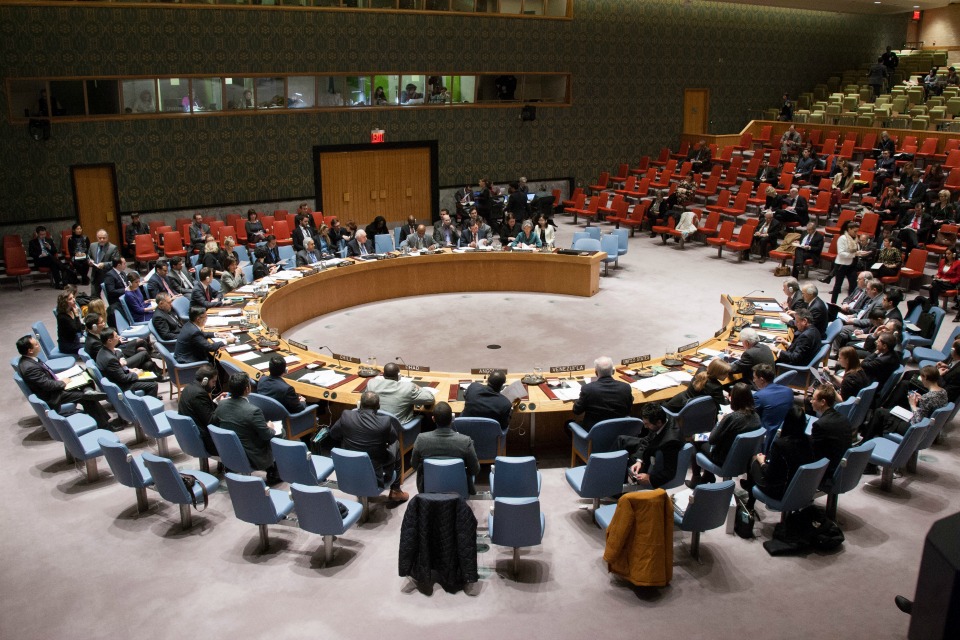"Next month will see the start of the fifth year of conflict in Syria"
Statement by Ambassador Mark Lyall Grant of the UK Mission to the UN, at the Security Council Syria Humanitarian Open Briefing

I thank High Commissioner Guterres and Assistant Secretary-General Kang for their briefings and for the remarkable work that both OCHA and UNHCR are doing to alleviate the suffering of the Syrian people. I welcome that we are holding this meeting in an open format today. It is vital that our horror at the scale of the humanitarian crisis in Syria and its neighbours and our condemnation of Assad and his brutal regime are heard loudly and clearly outside of this room.
Mr President,
Next month will see the start of the fifth year of conflict in Syria. Over two hundred and twenty thousand people are dead. 12.2 million people are reliant on humanitarian assistance. Almost half of the Syrian population is displaced. 7.6 million people have fled their homes within Syria and 3.8 million have taken refuge in neighbouring countries, causing massive security, economic and social challenges for all of Syria’s neighbours and in particular Lebanon, Jordan and Turkey. These statistics have been heard many times in this Council. But we have failed to take the necessary actions to put an end to this terrible conflict.
Assad’s regime bears direct responsibility for this situation.
Some member states claim that terrorism lies at the heart of the conflict. But the chair of the Independent Commission of Inquiry on Syria was quite clear on this point last week, when he said that terrorism was not the cause of the conflict, but the consequence of it.
Assad’s regime continues to target civilians and use barrel bombs and chemical weapons indiscriminately. He continues to abuse those held in detention; recruit child soldiers; deny civilians access to essential medical supplies; and to collectively punish civilians through the denial of essential services like water and electricity. This has created an environment which has spawned terrorist organisations like ISIL.
Assad’s actions, and others reported by the Commission of Inquiry, represent clear violations of international humanitarian law and human rights, and amount to crimes against humanity. As ASG Kang has reminded us, we must end the shameful culture of impunity in Syria, and hold the perpetrators of these crimes to account. Nor should we ignore the heinous acts perpetrated by ISIL and other extremist groups, including sexual violence, kidnappings and torture. It is manifestly obvious that the situation in Syria should be referred to the International Criminal Court.
Mr President,
A negotiated political transition based on the 2012 Geneva Communiqué is the only sustainable way to end the horror. We welcome the UN Special Envoy’s efforts to establish a freeze of aerial and heavy artillery attacks in Aleppo, which can be a first step to a broader political process. We encourage de Mistura to work with both the regime and the moderate opposition in the development of this proposal. But experience shows that we should not take the regime’s promises at face value, and in particular we must do all that we can to avoid another tragedy like that in Homs.
The Syrian regime must allow greater humanitarian access to besieged areas. Over 200,000 people now live their lives under siege – 80% of those people are besieged by regime forces. And 4.8 million people remain in dangerous and hard to reach areas. Last year the United Nations submitted twice as many requests for cross-line aid convoys than in 2013, and yet reached less than half as many people. A year on from resolution 2139, this is wholly unacceptable. We must preserve the few gains we have made on cross-border access and be resolute in our pressure on the Assad regime to grant access to other areas. I call on all Council and non-Council members to join our efforts in this.
Mr President,
We have been able to make a difference where we do have access. It has been over a year since the last reported polio case and international assistance has averted starvation and mass malnutrition. However, funding is not keeping up with the needs on the ground. The needs of the Syrian people are growing at more than six times the rate of funding. The 2015 UN appeals for Syria and the region now stands at $8.4 billion – 40% higher than last year.
Kuwait has shown great leadership in agreeing to host a third international pledging conference for the Syria crisis next month. We must match their leadership by pledging the support needed to meet the growing crisis. Hundreds of thousands of lives are at stake.
The United Kingdom is determined to play its role, and during her recent visit to Jordan, the Development Secretary announced a further $154 million of funding, bringing UK’s assistance for Syria’s humanitarian relief to $1.2 billion. This includes $145 million to provide education, protection and trauma care for children affected by the crisis, and to help prevent a lost generation of Syrians. I call on all Members of the United Nations to do their part and pledge further funding at the Kuwait conference.
Mr President,
Let me close by again thanking High Commissioner Guterres and Assistant Secretary Kang for their briefings. Their input and the input from experts on the ground are very useful for Council Members. We should be open to other such briefings, including from the International Committee of the Red Cross, and from Syrian activists in future months.
I thank you.